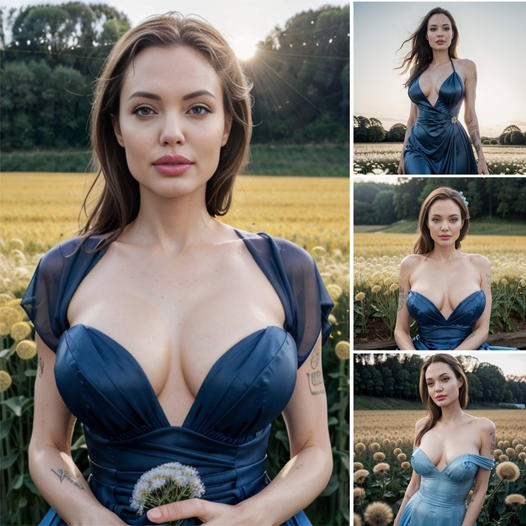Actress and filmmaker Angelina Jolie has gained recognition for her advocacy of human rights causes across the globe. Her recent project as a producer, called The Breadwinner, narrates the tale of an 11-year-old Afghan girl named Parvana. Parvana disguises herself as a boy to provide for her family in Taliban-led Afghanistan, where women were banned from working or receiving an education. In light of Harper’s Bazaar’s 150th anniversary, Jolie takes this opportunity to discuss women’s rights in today’s society and our collective obligation towards each other and the environment.
The invitation to write for this special anniversary issue of Bazaar made me contemplate how a female reader from 150 years ago, in 1867, would perceive us – the women of the present day. If only she had the chance to witness our world, what would she make of us?
Bazaar first graced the American magazine market a mere two years after the conclusion of the Civil War and the abolition of slavery. Back then, vehicles, antibiotics, and electric lighting did not exist, and the average lifespan did not extend beyond 50 years. The death of women during childbirth was still a prevalent occurrence.
Throughout the bulk of the 19th century, women in most Western countries were restricted from attending university, and numerous professions, such as medicine, science, and law, remained off-limits. Additionally, women were bereft of voting rights, a privilege that would take over half a century to be granted in various nations.
Therefore, in my imagination, if that reader from 150 years ago glimpsed the state of women today, she would undoubtedly be astonished. Considering her possible efforts towards women’s rights during her time, I am inclined to believe that she would express gratitude.

Alexi Lubomirski captures the essence of style with a casual yet elevated ensemble. Sporting a trendy Rag & Bone t-shirt and a pair of sleek Ralph Lauren Collection pants, Lubomirski effortlessly exudes sophistication. Completing the look are elegant Beladora earrings, which add a touch of refined charm to the overall aesthetic. The choice of Ariat Two24 boots ensures both comfort and style, while Jill Heller vintage bangles contribute a vintage flair. To make a personal statement, Lubomirski embraces individuality with a unique necklace and ring from Jolies own collection. With this fashion-forward ensemble, Alexi Lubomirski showcases his impeccable taste and fashion sensibility.

However, it also makes me curious about what an influential woman from the 19th century would think of the ongoing inequality that numerous women and girls face worldwide. Take, for instance, those who are forced to work instead of receiving an education, like the protagonist Parvana in the animated film “The Breadwinner.” Or the women who suffer premature deaths due to limited or nonexistent access to healthcare. Would this woman believe that we have done enough for them?
I had the privilege of encountering the most remarkable and resilient woman in my life, who happened to be a young Afghan refugee residing in an abandoned encampment near the Pakistan border. Despite being pregnant and with her husband away in search of employment, she displayed immense strength. The surroundings were not in her favor, as the mud shelters were being destroyed, and she had no means of locating her husband. With no roof above her head and no nearby medical facilities, her situation was dire. Nevertheless, she welcomed me into her humble space and graciously offered me tea.
Namibia, for me, signifies more than just familial and friendly connections. It represents the endeavor to strike a harmonious balance between humans and the environment – a balance that is vital for our collective future.
During our conversation, she inquired about my family and my homeland. Despite her hardships, she never asked for assistance beyond a mere visit and a heartfelt discussion. Her generosity and dignity shone brightly, and her gaze exuded unwavering clarity. On difficult days, I often recall her smile and the way she carried herself – as if she would give up every ounce of her remaining strength for her unborn child. Two weeks after our encounter, the tragic events of 9/11 unfolded. Given the subsequent developments in Afghanistan, I can’t fathom how she managed to navigate through it all. Did her husband return in time before the camp was demolished? Did she bear her child there, or was she forcefully displaced? Is she currently residing in a tent at some border, alongside her now-teenage child?
I recently came across a report by the World Economic Forum, which predicts that it will take a staggering 83 years for gender-based disparities in rights and opportunities to fully close across all countries. It is crucial to note that this is not about the advancement of women at the expense of men, but rather about achieving an equitable balance that benefits everyone. Eighty-three years seems like an exceedingly long time, surpassing the hopes and expectations of both men and women alike.
My mother, who had Iroquois ancestry through her father’s lineage, instilled in me the Iroquois principle of considering the consequences of our decisions on the next seven generations. Amidst the demands and pressures of our daily lives, it may be challenging to embody such thoughtfulness. However, I find it to be a beautiful aspiration worth striving towards.

The blouse worn by Gabriela Hearst and the earrings owned by Jolies are stylish and fashionable. The photo was taken by Alexi Lubomirski. As you read this, whether you’re a doctor, lawyer, scientist, human rights activist, student, teacher, mother, wife, or just a curious boy or girl looking through your mother’s magazine, I urge you to take a moment to reflect on how we can all contribute to creating a better future.
Predicting what the world will be like 150 years from now is difficult, but one thing is certain: our great-grandchildren will have to live with the consequences of the decisions we make today. It’s important to recognize that many of the problems we face today can be traced back to earlier centuries.
Take the 19th century, for example. It was during this time that the demand for ivory and other products derived from wild animals skyrocketed in some countries. This craze had devastating effects on the environment. The once abundant populations of elephants, lions, and other species in Africa have now been reduced to small, fragmented groups struggling to survive amidst relentless poaching and the encroachment of agricultural land.
We must acknowledge that our actions today have far-reaching consequences for the future. Let us all come together and think about how we can make a positive impact on the world around us.

The stunning images accompanying this article were captured in the beautiful Namib desert, within a nature reserve managed by the N/a’an ku sê Foundation. This extraordinary conservation organization is led by Marlice and Rudie van Vuuren, close friends of mine. Namibia holds a special place in my heart as it is where my daughter Shiloh was born, and my family has been involved in conservation efforts with Rudie and Marlice for the past ten years. For me, Namibia represents more than just personal ties; it symbolizes the delicate balance between humanity and nature that is crucial for our future.
The N/a’an ku sê Foundation focuses on supporting the San people of Namibia, who are recognized as the world’s oldest culture. This indigenous community has thrived for thousands of years, coexisting harmoniously with wildlife. However, like many other native populations, the San people have been forcibly displaced from their ancestral lands due to farming, unchecked development, and the decline in wildlife populations. This loss of natural habitat and wildlife has severely impacted their ability to sustain themselves and provide for their families.
Throughout the world, similar circumstances are occurring in regions such as Africa, Latin America, Asia, and the Pacific, with women bearing the brunt of the consequences. Women, who constitute the majority of the world’s impoverished population, often carry the responsibility of sourcing food, water, and fuel for their families. When the environment suffers damage, such as the destruction of fish stocks, poaching, or deforestation, it exacerbates their poverty. Women’s education and health are the first casualties. Furthermore, the environment plays a vital role in global stability, with climate change displacing 21.5 million people annually and contributing to a total of over 65 million displaced individuals worldwide.
In order to combat these challenges, N/a’an ku sê tirelessly works towards the preservation of natural habitats and the protection of endangered species, including elephants, rhinoceroses, and cheetahs (as captured in the photographs accompanying this piece). My personal connection with these majestic cheetahs began in 2015 when our family sponsored them as small cubs. Orphaned and close to death, these creatures were nursed back to health. However, due to their loss of fear towards humans, they cannot be returned to the wild as they would be at risk of being killed if they strayed onto farmland. With a global cheetah population declining to fewer than 7,100 individuals, the mission at hand is to save every animal possible.
By supporting organizations like N/a’an ku sê and advocating for the protection of our environment, we can pave the way for a sustainable future. As the San people wisely say, we are never truly lost as long as we can see our path towards the horizon. Let us stand together and choose to stand against the destruction of our planet, for it is our actions today that will define us tomorrow.

Dresses and rings from the renowned fashion brand Dior, captured by the talented photographer Alexi Lubomirski, are making waves. However, it is crucial to remember that these stunning images should not overshadow the fact that wild animals, like cheetahs, should never be kept as pets. Instead, they should inspire us to take action in preserving these magnificent creatures in their natural habitats.
Preserving the environment for future generations involves making conscious choices in our everyday lives. For instance, we can pledge to never purchase illegal wildlife products such as ivory or rhino horn. It is essential to recognize that fashion, in the past, had played a role in encouraging the demand for clothing, jewelry, and other items made from wildlife parts. However, today, magazines have the power to convey a different message—a message that emphasizes the importance of wild animals thriving in their native homes and that emphasizes that ivory only belongs on the tusk of a living animal.
What may seem like small individual actions can have a significant impact collectively. It is comforting to know that change lies within our hands. In the next 150 years, as technology continues to advance, we will have even more powerful tools at our disposal to communicate, eradicate poverty, uphold human rights, and care for the environment. However, it is the choices we make with the freedom we possess that will truly make a difference.
From my personal experiences, I have come to understand that our values and our stance against injustice ultimately define who we are. As the San people wisely say, as long as we can see our path towards the horizon, we are never truly lost.

Ralph Lauren Collection dress and K. Jacques sandals were worn by Angelina Jolie, a renowned filmmaker, special envoy of the United Nations High Commissioner for Refugees, and cofounder of the Preventing Sexual Violence in Conflict Initiative. The film, The Breadwinner, is set to release in North American theaters on November 17, with global release dates to follow.
Women’s Rights
It is a requirement under international law that women and girls be treated equally to men and boys. This includes complete equality in various aspects:
1. The right to participate in international, national, and local politics and society.
2. The right to education, employment, and economic access.
3. The right to health, including sexual and reproductive health.
4. The right to life and protection from violence, particularly rape and domestic violence.
5. The right to equality in their relationships within families, communities, and religions.
All countries worldwide have a legal obligation to ensure gender equality.
Source: London School Of Economics Centre for Women Peace and Security; Additional information can be found on unwomen.org.
Cheetah Sheet
The global population of cheetahs is currently less than 7,100.
Cheetahs have been disappearing from large parts of their historical habitat, which has decreased by 89 percent in the last century.
Illegal capture and trade of live cheetahs for pets, as well as hunting for their skins, are major threats to their survival.
The primary destination for live cheetahs in the pet trade is the Gulf States.
It is estimated that two-thirds of trafficked cheetah cubs die as a result of the illegal trade.
— Information sourced from IUCN Red List of Threatened Species
The N/a’an ku sê Foundation’s mission is to preserve the land, cultures, and wildlife of Namibia. The foundation provides a sanctuary and second chance for injured, orphaned, or vulnerable animals. The three cheetahs mentioned in this story were rescued and supported through the foundation. Animals are released back into the wild whenever possible to live a natural life. Only those that are too ill or too accustomed to humans remain at the sanctuary. The Jolie Pitt Foundation has been supporting N/a’an ku sê since 2006. During her recent visit to Namibia, Angelina inaugurated a new clinic for wounded elephants and rhinos.
For more information or to make a donation, please visit naankuse.com.
This article was initially published in the November 2017 issue, available for purchase from October 24.
Lead image: Alberta Ferretti top and pants; Hair by Adam Campbell for Wella Professionals; Makeup by Toni G. for smdcosmetics.com; Production by Colette Massier for N/a’an ku sê Films.



